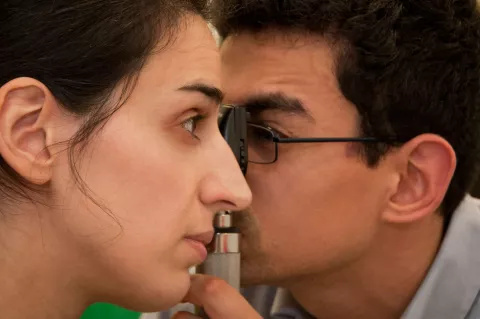Outpatients needed to help teach junior doctors
Thursday 6 November 2014

A small army of unsung patient heroes are educating our emerging junior doctors.
Although many visitors are aware that Guys and St Thomas’ are teaching hospitals, they might not know that patients are helping to instruct student doctors both in education and assessment, and that more are needed every day.
Long gone are the days of groups of doctors around the beds of patients who play guinea pig. Today, a key part of the Trust’s education process are patients taking part in an initiative designed and run by King's College Medical School. These specially trained patients are helping young doctors take histories, do investigations and take exams. Crucially, they give helpful feedback that the students can learn from.
Ros Tilley, director of medical undergraduate education, says: "These patients may have lived with illness for a very long time. They know huge amounts about their diseases and bring a richness to education. Students need to know what it’s like to be a patient, how to communicate and put them at ease, so they reveal more and give the doctor a complete picture of what’s going on. We always need more patient educators. They are invaluable to us.”
Patient Barrie Leyshon, a retired IT consultant, had throat cancer, and so had his larynx removed 8 years ago, followed by colon cancer this year. He’s been a patient educator for 7 years, with his first assignment an exam for laryngectomy students.
Barrie says: “The Trust and the College treat us as part of their team, and after 8 years with a rare illness, I have a lot of experience to offer. I’m so grateful that the hospitals have made me well so I feel that I’m paying back and doing something really useful. The sessions give the students a chance to actually talk to patients without any examiners looking over their shoulders. They give me great feedback and thank me for helping them learn.”
Before his illness, Barrie had a phobia about hospitals. Now he comes to St Thomas’ once a month for education sessions. Sometimes, he is asked to do special events and this September, in spite of his tracheotomy, Barrie spoke to three groups of 70 nurses who were training in long term conditions. Patient educators are also paid a fee for their time.
As Ros Tilley says: “We’ve got so many students to educate that we need many more outpatients to help us teach and assess our students. Their input is vital to let future generations of doctors know what patients want and how they want to be treated.”
If you would like to know more about getting involved in medical education, email: [email protected]
Last updated: March 2022
Contact us
If you're a journalist and have a media enquiry, please contact us.
Phone: 020 7188 5577
Email: [email protected]